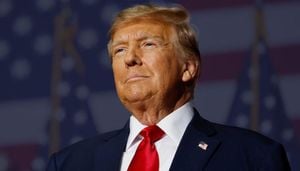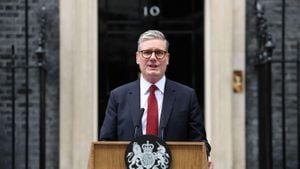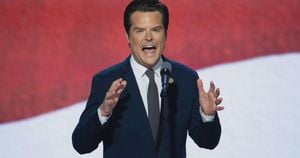The political theater surrounding cabinet appointments is heating up once again as the newly elected President Donald Trump puts forth names to fill key positions within his administration. Following his recent victory over Vice President Kamala Harris, Trump publicly celebrated his electoral mandate, proclaiming it as a clear signal from voters for systemic change. Having learned from his previous term, this time he appears ready to tread carefully, but not entirely cautiously, as he unveils his nominees.
One of Trump’s most contentious picks has been Florida Representative Matt Gaetz for Attorney General—a nomination critics argue is fraught with issues. Gaetz, known for his assertive political style, faces backlash not only for his qualifications but also due to his entanglements with various controversies. Alongside him, Trump has nominated Robert F. Kennedy Jr. for the Department of Health and Human Services, stirring considerable debate, particularly because of Kennedy's public stance on vaccines, which has drawn criticism from various health experts and politicians alike.
While Trump seems unfazed by the scrutiny, the opposition remains vocal. Democrats have rallied against several of Trump’s nominees, including Pete Hegseth, who has been nominated as Secretary of Defense and has garnered similar complaints about his qualifications. Prominent voices, including Massachusetts Senator Elizabeth Warren, have declared, "Pete Hegseth is not remotely qualified to be Secretary of Defense,” pointing out his military experience but questioning his fitness for the role's complex demands.
Hegseth’s nomination, particularly, demonstrates the tension between national defense and political loyalty. Critics highlight concerns about possible repercussions for military readiness under leadership they perceive as lacking relevant qualifications. This backdrop spills over to another proposed nominee, South Dakota Governor Kristi Noem, who is set to lead the Department of Homeland Security. Her track record on various state issues has sparked debate, leading some to question whether she possesses the breadth of experience required for such national responsibilities.
Meanwhile, Trump supporters have been quick to defend his cabinet choices, arguing the Democrats have hypocritically threatened to reject nominees with qualifications they deem inadequate without acknowledging their own controversial appointments. Political commentator Lauren Link pointed out, "The Democrats are melting down over Trump’s cabinet picks so far, but they had no problem with ‘Mayor Pete’ being appointed Secretary of Transportation with no prior qualifications.”
Also noteworthy is the constitutionality of these appointments. The Senate must conduct hearings and issue approvals for nominees but can delay the process, leading some to speculate Trump might resort to using recess appointments. This method enables the president to make temporary appointments when the Senate is not in session, bypassing the lengthy confirmation process. This tactic is not without precedent; previous administrations have deployed it amid similar partisan clashes.
Recess appointments have historically allowed presidents greater freedom when it came to filling key roles. For example, George W. Bush made 171 recess appointments, and Barack Obama utilized this method significantly during his presidency. The process can become complex, as the Senate often employs "pro forma" sessions to block such appointments. This decision typically reflects political maneuvering aimed at controlling presidential power, as seen during Trump's previous administration.
On the other side of this political equation lies the looming reality—past patterns indicate this Senate confirmation process can take substantial time, averaging around 115 days for Trump’s earlier nominees. With partisan tensions on the rise, observers are poised to see how Trump’s administration will navigate the Senate's confirmation battleground.
Another aspect raising eyebrows is the selection of Robert F. Kennedy Jr. as head of HHS. Critics have called him unqualified, pointing to his absence of scientific credentials as disqualifying. Health expert Leana Wen articulated, "HHS is a huge bureaucracy with over 80,000 employees. To lead it, one must have comprehensive oversight and respect for the scientific process.” Wen's remarks reflect widespread concern within the health community about Kennedy’s prior statements on vaccines, amplifying worries over potential public health repercussions should he take office.
The dynamics of these cabinet nominations encapsulate the broader picture of American politics—where each appointment becomes emblematic of differing ideologies and visions for the future. The stakes feel high as Trump aims to assemble his team to fulfill the promises made during his campaign. With much focus placed on who fills these roles rather than what they will achieve, it feels like the U.S. is entering yet another round of high-stakes political posturing.
While Trump's team has the backing of many who crave change, they also contending with strong opposition who insist on scrutiny and accountability. The upcoming weeks will reveal not only who can secure their appointments but also how Trump's vision for America will begin to take shape once the new administration assumes office. For now, the spotlight remains glued to the Senate, highlighting its role as both gatekeeper and battleground for the forthcoming policy directions the Trump administration is expected to pursue.
The juxtaposition of competing priorities between appointments reveals the stark divide within the American political system today. Will the party lines hold strong as they have before, or will there be room for negotiation and compromise? With every candidate, every vote, the American public continues to observe, reflecting on what these choices say about their leadership and values.



